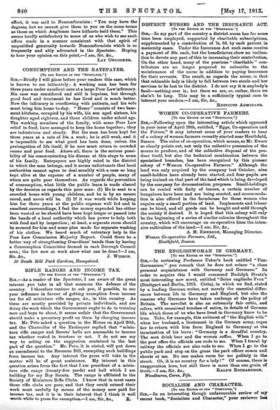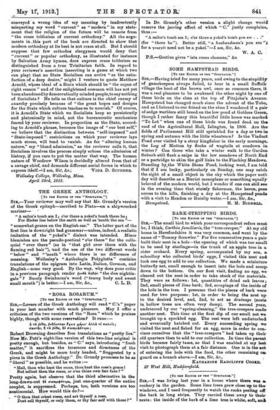SOCIALISM AND CHARACTER. [To THE EDITOR OP THE " SPECTATOR."1
SIR,—In an interesting though unfavourable review of my recent book, "Socialism and Character," your reviewer hail conveyed a wrong idea of my meaning by inadvertently misquoting my word " current " as " modern " in my state- ment that the religion of the future will be remote from " the crass tritheism of current orthodoxy." All the argu- ments in ,this part of the book are directed to show that modern orthodoxy at its best is not crass at all. But I should suppose that few orthodox clergymen would deny that "current" or popular orthodoxy, as illustrated for instance by Salvation Army hymns, does express crass tritheism as distinguished from a true Trinitarian faith. In regard to your reviewer's assertion (asserting is a game at which two can play) that no State Socialism can arrive " as the satis- faction of a deep desire," might I venture to quote Matthew Arnold, whose ideal of a State which should be " the organ of right reason" and of the enlightened common will has not yet been abandoned by democratically minded people,to say nothing of Socialists ? He tells us that culture is the chief enemy of anarchy precisely because of " the great hopes and designs for the State which culture teaches us to nourish." Of course, it is Arnold's State which we Socialists keep so persistently and platonically in mind, not the bureaucratic mechanism feared by your reviewer. In proportion as the State, accord. ing to Arnold's ,phrase, becomes the image of " our best self," we believe that the distinction between "self-imposed" and " State-imposed". restrictions on which your reviewer lays much stress, will tend to vanish. As for " altering human nature," my," bland admission," as the reviewer calls it, that Socialism involves the process simply echoes the admission of history, if you care to put the matter that way. The human nature of Woodrow Wilson is decidedly altered from that of a savage chief, and demands different social forms in which to











































 Previous page
Previous page